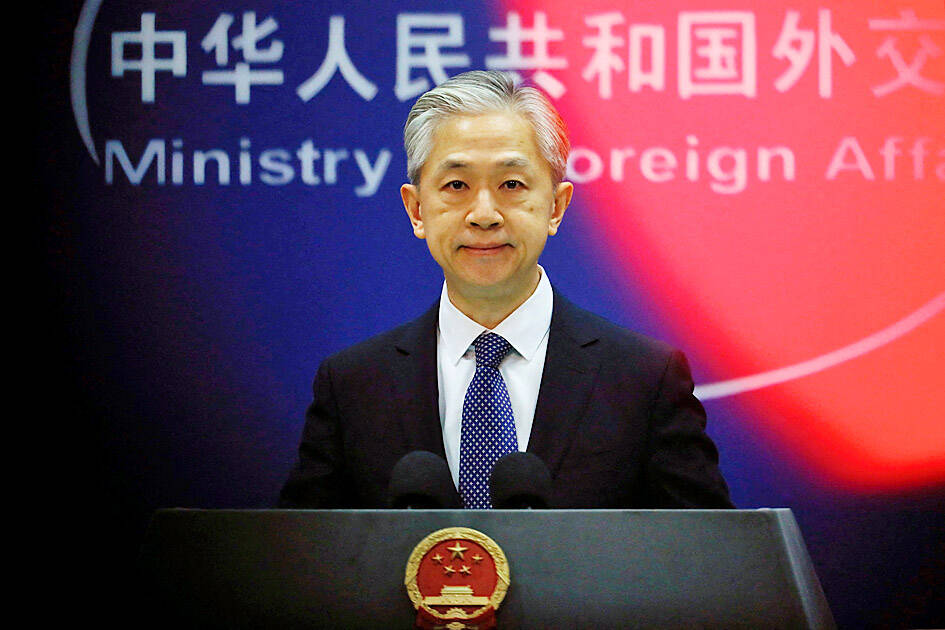China is targeting citizens studying abroad for their political activism, rights group Amnesty International said yesterday, with some students reporting harassment of family members back home.
China does not tolerate political dissent and has used sophisticated tech tools and intimidation to crack down on domestic protesters and activists.
Moreover, Beijing’s curbs on political activism are increasingly expanding abroad in the form of “transnational repression,” Amnesty International said in a report, citing interviews with dozens of students in eight European and North American countries.

Photo: Reuters
Overseas students reported that family members in China received threats after they attended events abroad, including commemorations of the bloody 1989 Tiananmen Square crackdown, the group said.
“Threats made to family members in mainland China included to revoke their passports, get them fired from their jobs, prevent them from receiving promotions and retirement benefits, or even limiting their physical freedom,” it said.
Students also said they had been blocked from posting and surveilled on Chinese social apps — often the only way to communicate with family members due to Beijing’s Internet firewall.
One student told Amnesty International that police showed his parents “transcripts of his online WeChat conversations with family members.”
Students said that they self-censored during classes and social interactions, and complained of mental health problems caused by the feeling of pervasive surveillance, “ranging from stress and trauma to paranoia and depression.”
“I would really want to publish my thesis ... but I’m worried, so I chose not to,” one student told Amnesty.
Asked about the Amnesty report, the Chinese Ministry of Foreign Affairs dismissed it as “purely malicious smears.”
“Any objective media outlet would find that the vast majority of Chinese citizens living abroad feel proud of the motherland’s development and strength,” ministry spokesman Wang Wenbin (汪文斌) said.
It has previously rejected claims that it targets citizens living abroad, insisting that it respects other countries’ sovereignty and that any policing operations are conducted in accordance with the law.
A report last year by US research group Freedom House found that China was responsible for hundreds of cases of “transnational repression” since 2014, including attempts to pressure other nations to forcibly return members of the Uighur minority.
Amnesty International yesterday said that Beijing’s targeting of students has “engendered a ‘climate of fear’ on university campuses across Western Europe and North America, negatively impacting upon students’ human rights.”
“The impact of China’s transnational repression poses a serious threat to the free exchange of ideas that is at the heart of academic freedom,” Amnesty International’s China director Sarah Brooks said.

The Central Election Commission has amended election and recall regulations to require elected office candidates to provide proof that they have no Chinese citizenship, a Cabinet report said. The commission on Oct. 29 last year revised the Measures for the Permission of Family-based Residence, Long-term Residence and Settlement of People from the Mainland Area in the Taiwan Area (大陸地區人民在台灣地區依親居留長期居留或定居許可辦法), the Executive Yuan said in a report it submitted to the legislature for review. The revision requires Chinese citizens applying for permanent residency to submit notarial documents showing that they have lost their Chinese household record and have renounced — or have never

A magnitude 5.6 earthquake struck off the coast of Yilan County at 12:37pm today, with clear shaking felt across much of northern Taiwan. There were no immediate reports of damage. The epicenter of the quake was 16.9km east-southeast of Yilan County Hall offshore at a depth of 66.8km, Central Weather Administration (CWA) data showed. The maximum intensity registered at a 4 in Yilan County’s Nanao Township (南澳) on Taiwan’s seven-tier scale. Other parts of Yilan, as well as certain areas of Hualien County, Taipei, New Taipei City, Taoyuan, Hsinchu County, Taichung and Miaoli County, recorded intensities of 3. Residents of Yilan County and Taipei received

Taiwan has secured another breakthrough in fruit exports, with jujubes, dragon fruit and lychees approved for shipment to the EU, the Ministry of Agriculture said yesterday. The Animal and Plant Health Inspection Agency on Thursday received formal notification of the approval from the EU, the ministry said, adding that the decision was expected to expand Taiwanese fruit producers’ access to high-end European markets. Taiwan exported 126 tonnes of lychees last year, valued at US$1.48 million, with Japan accounting for 102 tonnes. Other export destinations included New Zealand, Hong Kong, the US and Australia, ministry data showed. Jujube exports totaled 103 tonnes, valued at

BIG SPENDERS: Foreign investors bought the most Taiwan equities since 2005, signaling confidence that an AI boom would continue to benefit chipmakers Taiwan Semiconductor Manufacturing Co’s (TSMC, 台積電) market capitalization swelled to US$2 trillion for the first time following a 4.25 percent rally in its American depositary receipts (ADR) overnight, putting the world’s biggest contract chipmaker sixth on the list of the world’s biggest companies by market capitalization, just behind Amazon.com Inc. The site CompaniesMarketcap.com ranked TSMC ahead of Saudi Aramco and Meta Platforms Inc. The Taiwanese company’s ADRs on Tuesday surged to US$385.75 on the New York Stock Exchange, as strong demand for artificial intelligence (AI) applications led to chip supply constraints and boost revenue growth to record-breaking levels. Each TSMC ADR represents